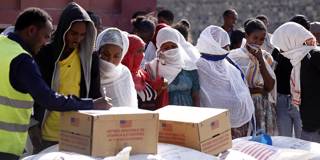With no sign that Ethiopia’s civil war will end anytime soon, the US and its partners must take action where they can to save lives. In particular, financial sanctions should be broadened to prevent further human-rights abuses, and creative humanitarian intervention is needed to head off mass starvation.
WASHINGTON, DC – Now that Ethiopia’s civil war has settled into a seemingly intractable slugfest, the United States must consider its options to prevent further loss of life. The US already is deeply engaged in efforts to mediate a ceasefire, working closely with the African Union, the European Union, and other interested parties. In that diplomacy, as in most African peace processes, the US has assumed a supporting role. Nevertheless, it can take the lead on two critical and lifesaving challenges: ensuring accountability for human-rights violations and preventing the use of starvation as a weapon of war.

WASHINGTON, DC – Now that Ethiopia’s civil war has settled into a seemingly intractable slugfest, the United States must consider its options to prevent further loss of life. The US already is deeply engaged in efforts to mediate a ceasefire, working closely with the African Union, the European Union, and other interested parties. In that diplomacy, as in most African peace processes, the US has assumed a supporting role. Nevertheless, it can take the lead on two critical and lifesaving challenges: ensuring accountability for human-rights violations and preventing the use of starvation as a weapon of war.